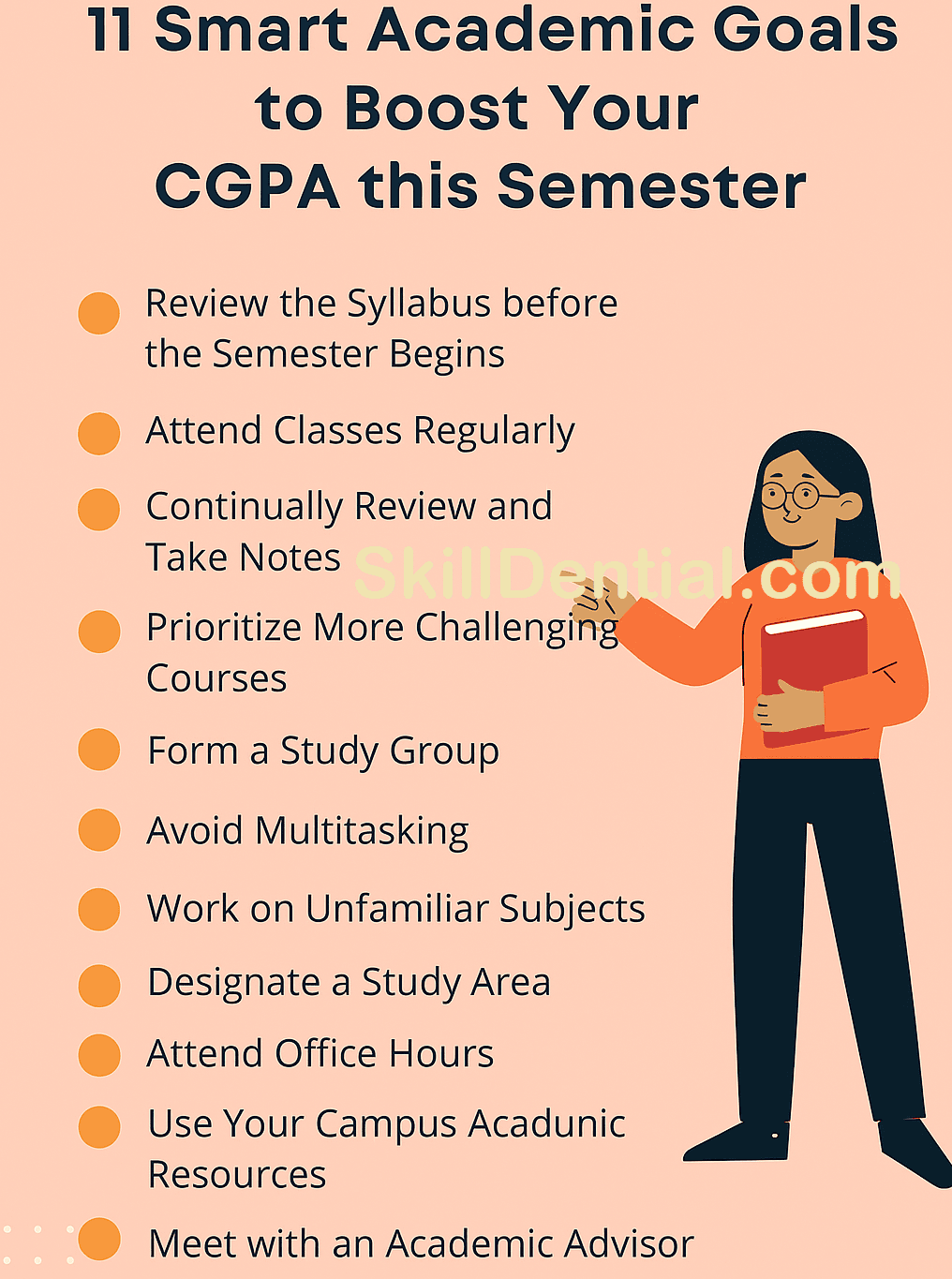Maintaining or improving your Cumulative Grade Point Average (CGPA) remains an essential and critical focus for Nigerian university students, particularly for undergraduates spanning from 100-level to 400-level/500-level. Your CGPA serves as a comprehensive reflection of your academic performance throughout the entire duration of your degree program and plays a significant role in determining your eligibility for scholarships, opportunities for postgraduate admissions, and competitiveness in the job market after graduation.
By setting smart, well-defined academic goals specifically aimed at boosting your CGPA this semester, you can effectively transform your academic journey from one filled with stress and uncertainty to a path marked by success and achievement.

Below, you will find a comprehensive list of 11 actionable, well-researched, and practical goals specifically designed to help you maintain focus, stay highly motivated, and become more effective in raising your CGPA. Each goal thoughtfully incorporates strategies that have been thoroughly proven by education experts and are especially relevant within the unique academic and cultural context of Nigerian universities.
Understanding Smart Academic Goals
Smart academic goals are designed to follow the well-known SMART framework, which stands for Specific, Measurable, Achievable, Relevant, and Time-bound. This approach ensures that goals are clearly defined rather than vague or broad, such as simply aiming to “get better grades.”
Instead, a smart goal is carefully structured to allow for easy tracking of progress and is realistic enough to be accomplished within a predetermined timeframe. For instance, instead of setting a general ambition like, “I want to improve my CGPA,” a SMART academic goal would be more precise and actionable, such as, “I will dedicate at least 10 hours each week to studying and aim to achieve a minimum grade of B+ in all my courses throughout this semester.”
Breaking down the SMART criteria for achieving academic success involves understanding each component in detail and how it contributes to effective goal setting and accomplishment in an educational context:
- Specific: Clearly and precisely identify exactly what you want to accomplish, such as mastering particular subjects in depth or achieving set grades in specific courses you are enrolled in. This clarity helps you focus your efforts and measure your progress effectively.
- Measurable: Make sure you establish clear and concrete criteria that allow you to track your progress effectively, such as monitoring your exam scores, assignment grades, or other quantifiable indicators of achievement. This way, you can objectively assess how well you are doing over time.
- Achievable: Set goals that are realistic and attainable, taking into careful consideration your current skills, available resources, and the amount of time you have at your disposal. This ensures that your objectives are practical and within reach.
- Relevant: Align your goals carefully with your broader academic aspirations, such as improving your CGPA significantly to increase your chances of qualifying for prestigious scholarships or gaining admission to competitive postgraduate programs and opportunities.
- Time-bound: Establish clear and specific deadlines to keep progress on track, such as aiming to achieve particular grades by the end of the semester or setting goals to improve scores every month. These time constraints help create a sense of urgency and provide measurable checkpoints to evaluate progress consistently.
This comprehensive framework is designed to assist students in moving beyond vague and generalized wishes by helping them develop clear, actionable plans. These plans not only foster a stronger sense of motivation but also encourage consistent effort and dedication. As a result, students experience tangible and measurable improvements in their academic performance over time.
Smart Academic Goals to Boost Your CGPA
To significantly boost your CGPA effectively this semester as a dedicated Nigerian university student, make sure to follow these 11 carefully selected and smart academic goals that can help you achieve greater success:
Set Specific Grade Targets
Clearly define the exact grades you aim to achieve in each course, with a particular emphasis on targeting an A or at least a B+ in high-unit courses that have a significant impact on your overall CGPA. By setting these specific grade targets, you create a clear and focused plan that makes your academic goals both measurable and actionable.
This approach allows you to effectively prioritize your efforts by focusing on the most important tasks first, and it also helps you monitor and track your progress consistently throughout the entire semester, ensuring that you stay on course and achieve your academic goals.
Maximize Continuous Assessment Scores
Continuous assessments play a significant role, contributing between 30 and 40 percent to your overall final grades. To maximize your score, it is important to excel in various components such as assignments, quizzes, presentations, and to consistently attend lectures.
By accumulating marks early through these activities, you can greatly reduce the pressure and stress associated with final exams. Additionally, maintaining full attendance is crucial, as it often secures valuable attendance marks that are frequently overlooked by students but can make a meaningful difference in your final grade.
Prioritize High-Unit Courses Strategically
High-credit courses have a significantly greater impact on your overall CGPA compared to lower-credit courses. Therefore, it is wise to dedicate a larger portion of your study time and effort to these courses to ensure strong performance.
When selecting electives, choose those that align well with your personal strengths or those known for having more favorable grading patterns. This strategic approach helps you maximize your academic efficiency and improve your overall grade point average more effectively.
Create and Stick to a Weekly Study Schedule
Commit 2 to 3 focused hours each day to your studies, breaking the content into smaller, manageable chunks that are easier to absorb and understand. Incorporate regular reviews of the material to reinforce your learning and help solidify the information in your memory.
Maintaining a consistent, daily study routine is significantly more effective than relying on last-minute cramming sessions, as it encourages deeper understanding and long-term retention of knowledge. This approach not only helps solidify the material in your memory over time but also reduces stress and anxiety associated with rushed studying.
Join or Form Study Groups
Collaborate actively with your peers to exchange diverse perspectives, clarify any doubts you may have, and reinforce your overall learning experience. Participating in weekly study group sessions can significantly enhance your understanding of the material and improve your preparation for exams or assignments.
These regular meetings offer a highly valuable opportunity for everyone involved to actively engage in meaningful discussions, ask insightful questions, and collectively deepen their understanding and knowledge on various topics.
Use Academic Resources Effectively
Make a strong effort to engage actively and consistently with your professors during their office hours, asking detailed questions and seeking a deeper understanding. Additionally, take full advantage of tutoring centers, review past exam papers thoroughly, and use a variety of online resources to clarify difficult concepts.
These combined strategies will not only significantly improve your understanding and mastery of challenging material but will also greatly enhance your overall preparedness and confidence for upcoming exams and assessments. By applying these methods consistently, you will find it easier to retain complex information and perform better in test situations.
Improve Note-Taking and Revision Techniques
Develop an effective method for concise note-taking during lectures that emphasizes identifying and recording repeated key points and important themes. Pay close attention to concepts and ideas that the lecturer highlights multiple times, as these are often crucial to understanding the subject matter. Create a system, such as using symbols or abbreviations, to quickly mark these recurring points for easy reference.
Additionally, establish a routine of regularly reviewing your notes after each lecture to reinforce your comprehension and gradually build mastery over the material. This consistent review process will help solidify your grasp of the key concepts and improve long-term retention.
Maintain a Healthy Work-Life Balance
Balance your study time with ample relaxation, regular exercise, and engaging social activities to effectively prevent burnout and maintain overall well-being. Students who prioritize a healthy lifestyle are more likely to sustain their focus, retain information better, and achieve consistently high academic performance throughout their educational journey.
Set Incremental Milestones with Deadlines
Break your semester goals into smaller, manageable steps with specific, clear deadlines for each task (for example, aim to finish assignments well ahead of their due dates and focus on mastering individual chapters every week).
This approach will greatly help you stay well organized and keep a consistent, steady progress moving forward throughout the entire semester, allowing you to manage your tasks effectively. By following this method, you will also significantly reduce the chances of facing last-minute stress or being overwhelmed by heavy workloads that can pile up unexpectedly.
Seek Feedback and Act on It
Make it a regular habit to seek detailed feedback from your lecturers or tutors on all assignments and exams you complete. Carefully review their comments and suggestions, then thoughtfully apply their advice to enhance your work quality and deepen your overall understanding of the subject matter.
This continuous and ongoing process of actively receiving detailed feedback and thoughtfully implementing it will significantly help you to consistently improve your overall academic performance as well as deepen your understanding and mastery of the course material.
Leverage Time Management Tools and Techniques
Make use of planners, digital apps, or physical calendars to effectively organize and keep track of your tasks and important deadlines. Prioritize your study sessions by considering the number of credits each course carries as well as the urgency of upcoming assignments or exams, ensuring that you manage your workload as efficiently and productively as possible.
These strategies are strongly supported by practical experience shared by Nigerian students who successfully boosted their CGPA, alongside educational best practices emphasizing discipline, prioritization, and consistent effort. By setting clear, measurable, and realistic academic targets and managing your time well, you can take control of your semester performance and steadily lift your CGPA toward your desired goal.
In Summary

Make your goals specific and measurable by clearly defining what you want to achieve and setting concrete criteria to track your progress. Focus on continuous assessments and high-credit courses to ensure steady improvement and maximize your academic credits.
Maintain consistent study habits by creating and following a regular schedule that allows you to review material frequently and stay on top of your coursework. Engage actively with peers and academic resources, such as study groups, tutoring centers, and online forums, to deepen your understanding and gain different perspectives.
Manage your time wisely by prioritizing tasks, avoiding procrastination, and striking a balance between your academic responsibilities and personal commitments. This comprehensive and well-rounded approach helps you build strong discipline, avoid common pitfalls like last-minute cramming or burnout, and ultimately maximize your academic potential throughout the entire semester.
Current Trends in Academic Goal Setting
Current trends in academic goal setting reflect a global shift toward using evidence-based strategies and digital tools that enhance learning efficiency and academic planning. Students at Nigerian universities, like their global counterparts, increasingly adopt the SMART goal framework—setting Specific, Measurable, Achievable, Relevant, and Time-bound objectives—to structure their studies effectively.
Techniques gaining traction include spaced repetition and active recall, which are proven to improve long-term retention of knowledge and boost exam performance. Blended study groups, combining in-person and online collaboration, also help deepen understanding through peer support and diverse perspectives.
In the Nigerian educational context, continuous assessment plays a crucial and highly significant role in the overall determination of students’ final grades. This means that early involvement and consistent participation in assignments, quizzes, and other forms of continuous evaluation are essential and serve as a critical factor for academic success.
Additionally, students are increasingly adopting strategic approaches when selecting their courses, carefully considering the credit units assigned to each course as well as their own personal strengths and academic capabilities. This thoughtful selection process is aimed at helping them maximize their cumulative grade point average (CGPA) and achieve better academic outcomes throughout their studies.
Nigerian universities are expanding access to digital learning materials and resources, fostering a more self-directed and flexible learning environment. Students leverage these resources alongside traditional study methods to customize their academic experience, improve comprehension, and enhance performance.
Overall, the effective integration of smart goal setting, innovative modern study techniques, and advanced digital tools is significantly shaping a more proactive and dynamic academic culture. This evolving environment empowers Nigerian students by equipping them with the necessary skills and strategies to achieve higher academic outcomes. It helps them better manage their increasingly demanding university workload with greater efficiency and confidence, ultimately fostering sustained academic success and personal growth.
FAQs
How soon should I start working on these academic goals?
It is best to start early in the semester to build positive momentum and spread out your workload. However, even if you begin mid-semester, focused and disciplined effort can still yield significant improvements in your grades and CGPA.
Can these strategies help if my current CGPA is low?
Concentrating on high-impact courses, maximizing continuous assessments, improving study habits, and managing your time efficiently can substantially boost your CGPA over the semesters that follow. Progress may take consistency, but it is definitely achievable.
What if I have too many courses? How do I manage goals effectively?
Prioritize courses by credit unit weighting and difficulty level. Allocate more study time to courses that carry heavier credit units or where you struggle most, while maintaining enough focus across all courses for steady performance.
How do I stay motivated throughout the semester?
Celebrate small achievements, track your progress with measurable milestones, and engage with supportive peers or mentors who can encourage and guide you. Having a strong study network and visible progress often boosts motivation.
Are there digital tools recommended for goal tracking?
Applications like Todoist, Google Calendar, and Notion are excellent for organizing assignments, planning study schedules, setting deadlines, and tracking academic goals efficiently. Leveraging such tools improves time management and ensures you meet milestones.
These answers combine practical strategies grounded in the Nigerian university academic environment and are informed by experiences shared by successful students and educators. By starting early, prioritizing wisely, leveraging assessments, managing motivation, and utilizing digital tools, Nigerian undergraduates can meaningfully enhance their CGPA and academic success.
In Conclusion
Setting and diligently pursuing well-defined, smart academic goals that are specifically tailored to align with the unique structure, challenges, and demands of the Nigerian university system can have a profoundly positive and transformative impact on your overall CGPA this semester. By carefully crafting these goals to fit the particular academic environment you are in, you increase your chances of achieving outstanding results.
It is essential to be highly specific in your objectives, place strong emphasis on continuous assessments such as assignments and tests, prioritize your tasks strategically based on their importance and deadlines, manage your time effectively to avoid last-minute stress, and maintain a well-balanced lifestyle that supports both your physical and mental well-being.
By consistently applying these carefully considered strategies, you empower yourself to take full control of your academic journey, unlock a wide range of future opportunities, and ultimately achieve a high level of academic excellence and personal fulfillment.
By fully embracing and embodying these important goals, you become part of a rapidly expanding group of proactive and motivated learners who are actively transforming their university experience. This transformation goes far beyond simply attending classes and fulfilling basic requirements; it leads to truly outstanding academic achievement and personal growth throughout your time at university.
Discover more from SkillDential
Subscribe to get the latest posts sent to your email.


